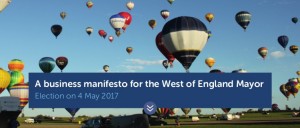The West of England’s largest business organisation has called on all candidates in next week’s Metro Mayor election to show they will deliver long-term economic growth for the region.
Business West, which includes the West of England Initiative and the chambers of commerce for Bristol, Bath & North East Somerset and South Gloucestershire, has laid out its challenge by highlighting key issues affecting businesses, as well as setting out the core attributes the winning candidate will need to successfully deliver the economic promise of devolution. 
The organisation represents around 21,000 businesses across the West of England and has joined forces with the Institute of Directors, Black South West Network, Bristol Media and TechSpark to urge the six candidates to listen to businesses in their last week of campaigning.
With an additional £900m in funding secured from central government over the next 30 years, the Metro Mayor will have a lead role in the social and economic future of the region – especially in the area of infrastructure.
The lack of a clear strategic approach to key areas such as transport across the three local authorities of Bristol, Bath & North East Somerset and South Gloucestershire is widely seen as having acted as a brake on economic growth by Business West and other business organisations.
Skills are also high on the agenda for business organisations. Improving the skills base of the workforce is not only good for business, it has a profound impact on our communities, bringing opportunities to disadvantaged groups. The Metro Mayor will have much to do in terms of helping to match the skills and attitudes of the local labour market to the available jobs, Business West says in its ‘challenge’.
Transforming the West of England’s digital infrastructure also ranks highly. The gross value added in the region by tech and digital businesses alone stands at £1.8bn a year, and grew by 26% between 2010 and 2014. A strong digitally-enabled city region brings promising opportunities for growth, employment and stronger communities and the Metro Mayor and combined authority need to deliver the infrastructure to make the West of England the leading digital hub of the UK, says Business West.
The issue of employment land is also raised in the ‘challenge’. Businesses need a physical location, be it agile modern offices, warehouses, start-up spaces, live/work developments, business parks or factories. Alongside being a great place to live, the West of England needs to provide great places to work.
These have to meet the needs of the region’s full range of diverse and growing businesses – including the ability to attract new and relocating businesses to help strengthen and regenerate our economic base.
Bristol Chamber of Commerce and Initiative chief executive James Durie said: “Key to delivering on the promise of devolution for businesses and residents is strengthening decision making at a regional level.
“This requires a strong single voice, the ability to understand issues and the capacity to build alliances and convince decision makers at the highest levels.
“Furthermore, the Mayor must take a collaborative approach, working in partnership with local government, businesses and local communities to get on and make things happen which will strengthen this area as the best place to live and work.”
The six candidates standing in the first West of England Combined Authority mayoral election are:
Tim Bowles – The Conservative Party Candidate
Aaron Warren Foot – UK Independence Party (UKIP)
Darren Edward Hall – Green Party
Lesley Ann Mansell – Labour and Co-operative Party
John Christopher Savage – Independent
Stephen Williams – Liberal Democrats






























